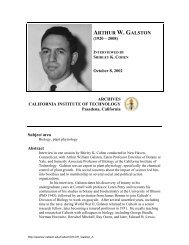Interview with Thomas A. Tombrello - Caltech Oral Histories
Interview with Thomas A. Tombrello - Caltech Oral Histories
Interview with Thomas A. Tombrello - Caltech Oral Histories
You also want an ePaper? Increase the reach of your titles
YUMPU automatically turns print PDFs into web optimized ePapers that Google loves.
<strong>Tombrello</strong>–3<br />
TOMBRELLO: Bisacquino. I’m not sure of the pronunciation. It was a little town, associated <strong>with</strong><br />
mines. He and his brother came in through New Orleans, where they were lynching Sicilians—<br />
probably <strong>with</strong> good reason—and they followed the mines and ended up in northern Alabama,<br />
because the iron and coal mines there were still a big thing.<br />
ASPATURIAN: A thirteen-year-old boy and his nine-year-old brother?<br />
TOMBRELLO: Yes. Some small fraction of kids who were thrown out in the world that way<br />
survived. I learned later that Lee Iacocca’s father was twelve when he came to America. It was<br />
not just Sicilians. It was all ethnic groups who came from places where poverty and starvation<br />
made them desperate. If they had a boy who was big for his age, or aggressive for his age—<br />
probably the case <strong>with</strong> my grandfather—they threw them out in the world. Their job was to save<br />
the family, which they did, surprisingly enough. But, of course, if they hadn’t saved the family, I<br />
wouldn’t be here being interviewed. So it was a self-fulfilling prophecy.<br />
ASPATURIAN: Anthropic principle of the <strong>Tombrello</strong> family.<br />
TOMBRELLO: Absolutely. Weak anthropic principle. So by means no one quite knows, my<br />
grandfather fought in the Spanish-American War. He was a muleskinner, a muleskinner being a<br />
person who handles the mules. Things were pulled, hauled, whatever, <strong>with</strong> mules, in those days,<br />
on the battlefields, in the coal mines. He started handling the mules because presumably that is<br />
what he had done as an even younger child in Sicily. By means that no one ever talks about, and<br />
that probably nobody even knows about anymore, he ended up owning a small mining town. So<br />
“we” owned a company store. We paid people in company money. And we were not exactly an<br />
equal-opportunity employer, I gather. But we didn’t learn that in Sicily, I suspect; we probably<br />
learned it from the people we replaced in northern Alabama, because that was the way of the<br />
world then. We could go more into this later, but in some ways, it’s a bit of a distraction. But it<br />
shows that the people I come from were survivors and very tough. As for my mother’s side of<br />
the family, you might say the only person my grandfather felt was as tough as he was, was my<br />
little German-American mother.<br />
My mother met my father in Austin. He had come there by another strange route. He<br />
had grown up in Alabama, escaped the family business, and become a stock boy in a variety<br />
http://resolver.caltech.edu/<strong>Caltech</strong>OH:OH_<strong>Tombrello</strong>_T

















